jus-, just-, jur-
(Latin: right, upright, equitable; legal right, law)
Directly related to the jud-, judic- unit.
Nemo tenetur jurare in suam turpitudinem.
No one is bound to swear to the fact of his own criminality.
No one can be forced to give his own oath in evidence of his guilt.
objurgate (verb), objurgates; objurgated; objurgating
1. To severely rebuke, to scold, or to censure: Luke’s mother objurgated, or chastised, him harshly when she found out that he had taken money from her purse without her permission!
2. To express strong disapproval of something that has been done or of the one who has done it: Mrs. Smith was vehemently objurgating the racism that existed in the school where she taught.
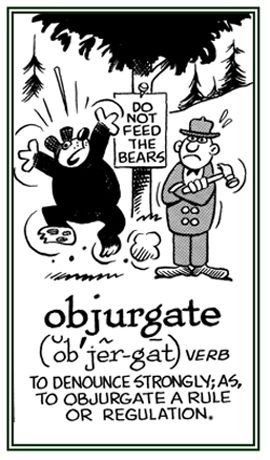
© ALL rights are reserved.
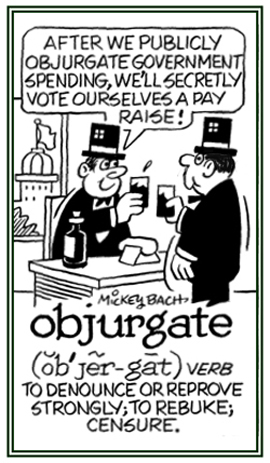
© ALL rights are reserved.
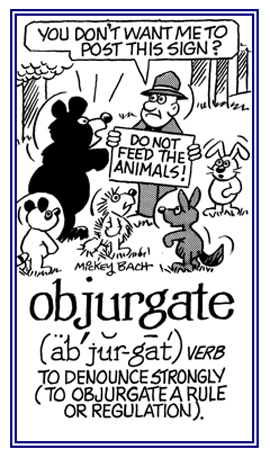
© ALL rights are reserved.
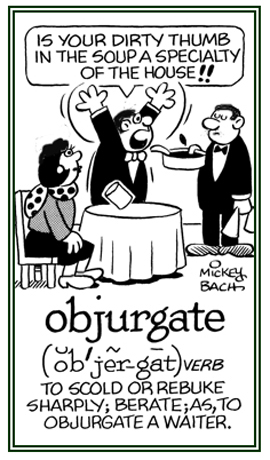
© ALL rights are reserved.
Go to this Word A Day Revisited Index
2. To express strong disapproval of something that has been done or of the one who has done it: Mrs. Smith was vehemently objurgating the racism that existed in the school where she taught.




Go to this Word A Day Revisited Index
so you can see more of Mickey Bach's cartoons.
A harsh criticism or rebuke: Mary got a severe scolding or objurgation from her parents because she didn't call to tell them that she would be very late in returning home that evening.
objurgative (adjective)
objurgatively (adverb)
Someone who expresses a strong disapproval of something, of a person, or of people: "As an objurgator, Trent scolded his children for making such a mess by walking in the mud and tracking it into the house and on to the rug."
objurgatory (adjective), more objurgatory, most objurgatory
Descriptive of a strong scolding; reproving: Tim received an objurgatory remark from his girlfriend when he had no excuse for not meeting her at the train station although he said he would.
Pax et justitia.
Peace and justice.
Motto of Johann Georg II, Elector of Saxony (1613-1680).
perjure (verb), perjures; perjured; perjuring
1. To knowingly tell an untruth in a legal court and render oneself guilty of not telling the truth: "Although the police officer swore that he had not been involved in bribery, the marked bills were evidence that he had perjured himself."
2. To make (oneself) guilty of deliberately testifying falsely under oath.
2. To make (oneself) guilty of deliberately testifying falsely under oath.
1. Someone who deliberately gives false testimony in a court of law.
2. A person who intentionally lies while under an oath administered by a notary public, court clerk, or other official, and thus commits the crime of perjury.
2. A person who intentionally lies while under an oath administered by a notary public, court clerk, or other official, and thus commits the crime of perjury.
A perjurer may commit perjury in oral testimony or by signing, or acknowledging, a written legal document; such as, an affidavit, declaration under penalty of perjury, deed, license application, or tax return, while knowing that the document contains false information.
In English, considered to be a misspelling of perjurer; however, some other languages may use "perjuror" as their spelling reference.
1. A criminal offense of making false statements under oath.
2. The telling of a lie after having taken an oath to tell the truth, usually in a court of law.
3. Etymology: from 1387, "act of swearing to a statement known to be false", via Anglo-French parjurie (1292) and Old French parjurie, both from Latin perjurium, "false oath", from perjurare, "to swear falsely"; from per-, "away, entirely" + jurare, "to swear". The verb perjure is attested from 1453 (implied in perjured).
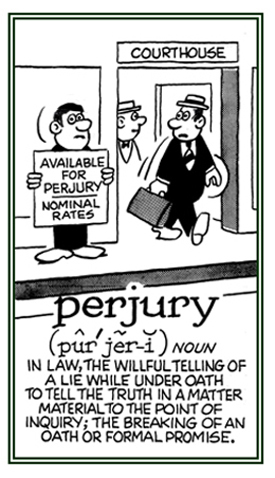
© ALL rights are reserved.
Go to this Word A Day Revisited Index
2. The telling of a lie after having taken an oath to tell the truth, usually in a court of law.
3. Etymology: from 1387, "act of swearing to a statement known to be false", via Anglo-French parjurie (1292) and Old French parjurie, both from Latin perjurium, "false oath", from perjurare, "to swear falsely"; from per-, "away, entirely" + jurare, "to swear". The verb perjure is attested from 1453 (implied in perjured).

Go to this Word A Day Revisited Index
so you can see more of Mickey Bach's cartoons.
Pie et juste.
With piety and justice.
Motto of August Friedrich, Duke of Schleswig-Holstein-Gottorp (1646-1705).
Pie, juste, temperanter.
With piety, justice, and moderation.
Motto of Friedrich IV, Count of the Palatinate (1594-1610).
Pietas et justitia principatus columnae.
Piety and justice are the supports of government.
Motto of Adolf Friedrich I, Duke of Mecklenburg-Schwerin (1588-1658).


